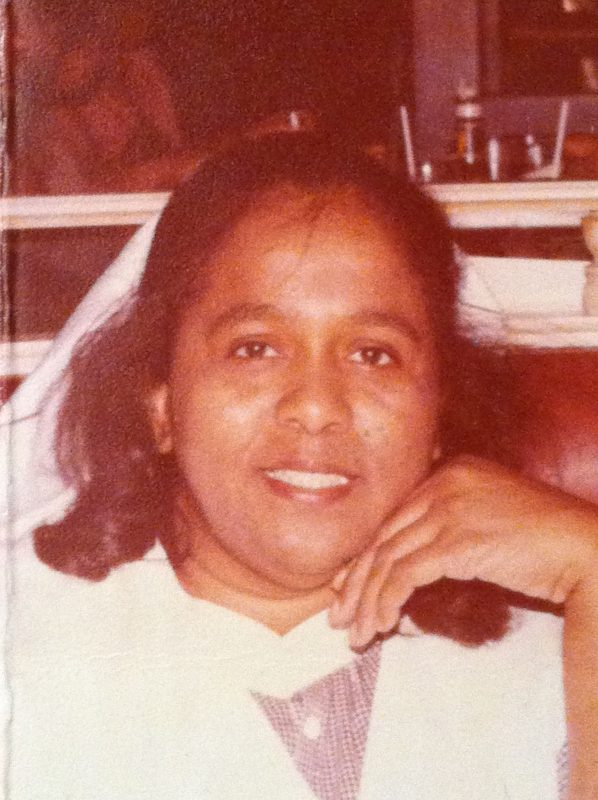My mother was the first writer I ever knew.
For as long as I can remember, Mama worked on a project she called “my book” — a story entitled 617 Crawford, written in careful longhand with changing colors of ink on unlined white paper kept in a 3-ring black binder. She was excited to discover the term roman a clef, because it described what she was attempting — a novel with real events and real people assigned fictional names. She wrote her book off and on for many years, in her so-called free time.
There was very little of that in my mother’s life, as she was the quintessential matriarch: running a household while married to my father and then my stepfather, and raising five children as well as her grandson. She worked both inside and outside of the home — a housewife who managed rental properties — and somehow still found time to offer guidance and counsel to a plethora of friends and family who steadily streamed through our side door.
And so, it was usually when she went on vacation — to places like Miami or Aruba or Las Vegas — that she took with her that black binder, and while sitting at a hotel-room desk, worked on her book. Over the years, she accrued a total of 43 handwritten pages.
In nearly every way, Mama was an improbable writer. Born in 1928 in Nashville, Tennessee, the ninth of 10 children, she had no more than a high school education. She was a mother and wife by age 18, and had three children by 1955 when she and my father migrated to Michigan. They had lean years while my father tried to find steady work in Detroit’s auto plants, and along the way had two more children, myself the youngest. When life improved, we moved to a four-bedroom brick Colonial house in a good neighborhood. Still, she certainly did not, as Virginia Wolfe advised women writers, carve out “a room of one’s own”. There was no time for that. Mama often said of her life that she had to “make a way out of no way” for her family. Writing was a luxury.
Still, as I look back, I realize she had all the qualities that good writers possess: She had a clear point of view about the world, and well-honed debating skills. She was a voracious reader with a wide berth of interests. She loved history, facts and metaphysics. Our den shelves were crowded with everything from World Book Encyclopedias to W.E.B. Dubois (her favorite writer), to books by psychic Edgar Cayce, to the holy Bible. Every day, she carried the morning’s Detroit Free Press from the front porch where it was delivered to the kitchen to the bathroom to her bedroom — reading it front-to-back in the process.
And she was certainly a magnificent storyteller, keeping listeners enthrall as she shared some tale about so-and-so that left us shaking our heads in disbelief or laughing with incredulity. She enjoyed holding court, often from the kitchen table and just as likely from her king-sized bed. Usually, hers were cautionary tales, and she knew how to gesture with expressive hands to dramatize a point, pause for emphasis, then say, “And you know what happened, don’t you?”, as we all leaned in to hear the end of the story. Mama’s natural sense of suspense and pacing was impeccable.
The other key writer’s skill my mother possessed was a keen understanding of what makes people tick. She was intuitive about others, could judge a person’s makeup after a first encounter, and understood the psychology behind human nature — great insights for character development.
While the world never knew about Mama’s novel, its presence remains more valuable to me than any one of the hundreds of books I’ve read in my lifetime. That story, and knowing my mother was working on it, gave me permission to become a writer myself. There were other validations: she bought a writer’s desk and bookshelf for my bedroom when I was 10, gave me my first journal when I was 12 and later, didn’t flinch when I chose an impractical English major in college. But it was the magic of what lay within the pages of that black binder that set my own course in life.
A few months before she died, when she knew her cancer was terminal but we did not, my mother sat at the kitchen table, put on her reading glasses, and read her entire story aloud. It was a private reading for just my sister Rita and me; I still remember, 21 years later, that Mama recited the words she’d written in a low, confident voice. Her story began:
“As the bus rolled along the Kentucky road nearing the Tennessee borderline, many thoughts filled the mind of Rose Miller, fifteen years old, beautiful, pregnant and running away from home.”
I marvel that my mother, who never took a single writing class, crafted an opening sentence that defined the main character, established the setting and dropped us into the action, complete with complication and suspense. You want to read more.
Thursday would’ve been my mother’s 85th birthday. Had she lived, I have no doubt she would’ve devoted time to completing her book. That soft, black binder now sits on the shelf beside the desk where I write. Its back cover is torn off, pages stained, ink starting to fade. No matter.
Today as we honor our mothers, I thank mine for the gift of a writing life — for showing me through example that it’s the process and not the outcome that matters, that many years spent telling your tale doesn’t lessen its value. And that writing — putting down one word after the other — is a drumbeat toward eternity. Words live on. And through lovely cursive handwriting that moved across dozens of white pages, so does my mom – Fannie Mae Drumwright Davis Robinson. Writer.


